

-- In 2021, new waves of COVID-19 infections from the ravaging pandemic are still one of the most threatening challenges facing the world at large;
-- With the pandemic still raging and some new COVID-19 variants being more contagious, recent surges in COVID-19 cases have added uncertainty to the eagerly-anticipated global economic recovery;
-- Instability and social unrest remain as a major theme for some regions this year, which asks for unremitting efforts of relevant parties to cool down tensions and maintain negotiations to find a way out.
BEIJING, Jan. 13 (Xinhua) -- A year that was largely defined by the COVID-19 pandemic finally ended, but challenges still lie ahead for the global community to deal with.
Countries and organizations need to ramp up cooperative efforts to be better prepared for new waves of COVID-19 infections, seek recovery of the hard-hit global economy, and maintain stability in regions that have seen turmoil over the past year.

People walk past shopping carts in New York, the United States, Jan. 9, 2021. (Xinhua/Wang Ying)
TACKLING NEW WAVES
In 2021, new waves of COVID-19 infections from the ravaging pandemic are still one of the most threatening challenges facing the world at large.
In the United States, a country that boasts the most advanced medical technology, some 22.8 million people have been infected with the virus and more than 380,000 lost their lives.
Anthony Fauci, the nation's top infectious disease expert, recently warned that without substantial mitigation, the middle of January could be a really "dark time" for Americans.
One of the major problems exposed in the country's fight against the pandemic is its lack of a unified response on the national level, said Da Wei, a professor with China's University of International Relations.
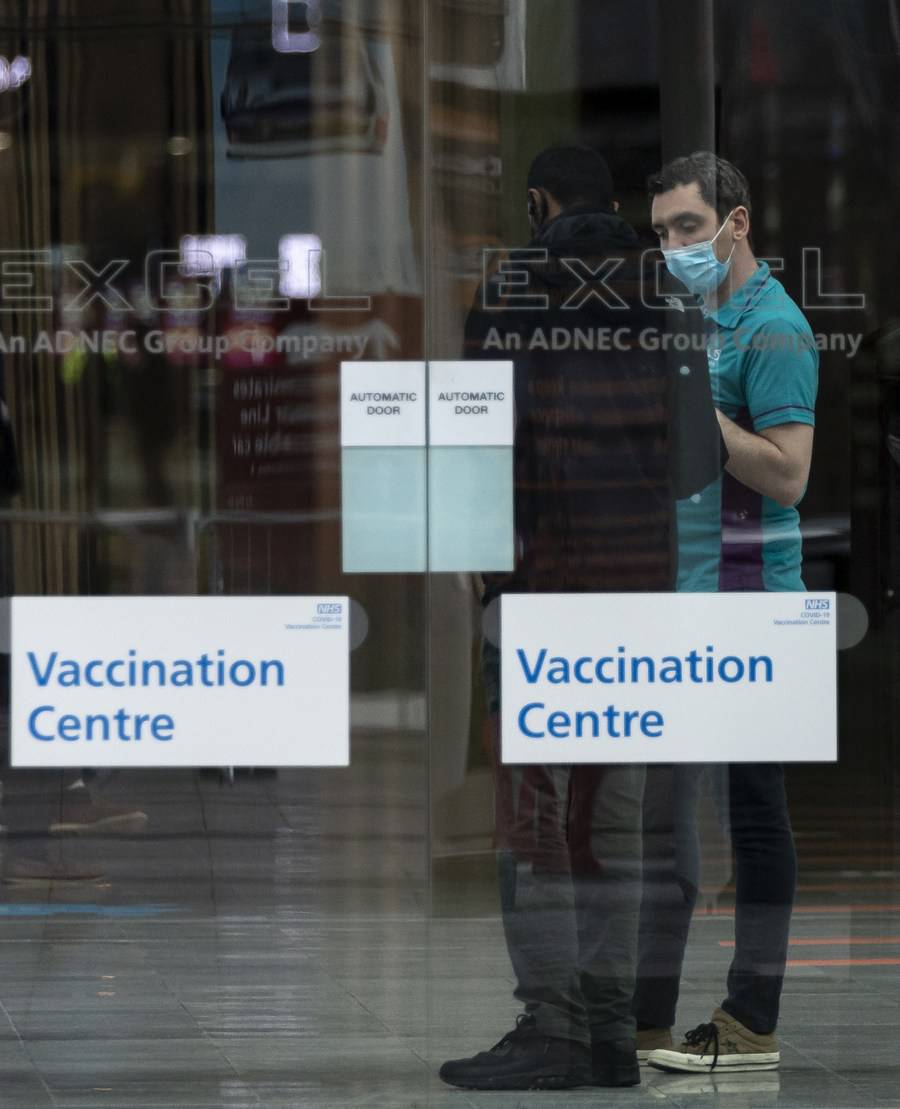
A staff member wearing a face mask is seen in the Vaccination Centre at ExCel exhibition centre in London, Britain, Jan. 12, 2021. (Xinhua/Han Yan)
Globally, the number of confirmed cases has topped 91.5 million, with a death toll of more than 1.9 million, according to the real-time count kept by Johns Hopkins University.
To speed up rolling out safe and effective COVID-19 vaccines and their equitable allocation across the world is an urgent task in 2021, as World Health Organization (WHO) Director-General Tedros Adhanom Ghebreyesus said Monday.
Vaccination is underway in some countries with the already-authorized coronavirus vaccines, while 235 candidate vaccines are still being developed worldwide, according to information released by the WHO last week.
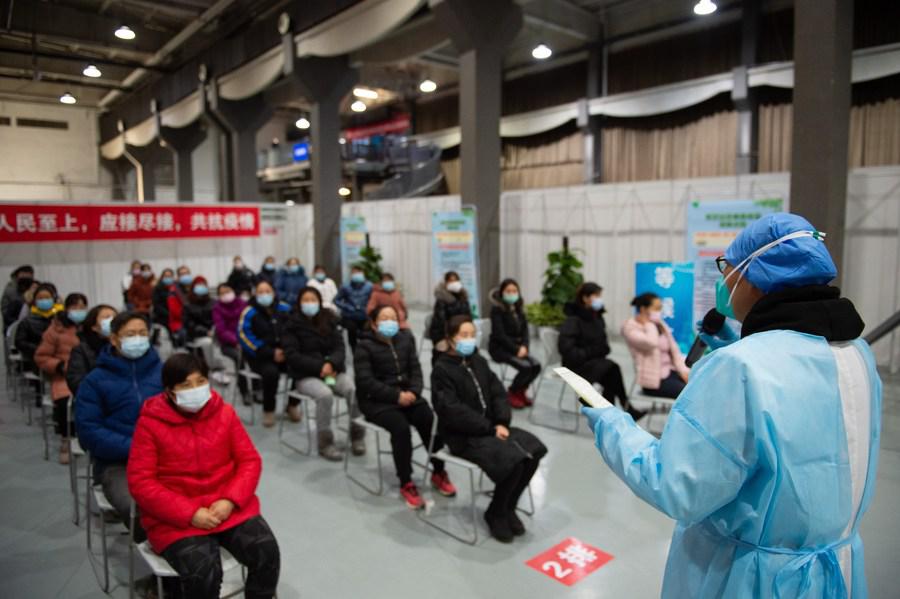
A staff member elaborates precautions before people receive COVID-19 vaccine shots at an inoculation site in Chaoyang District, Beijing, capital of China, Jan. 5, 2021. (Xinhua/Chen Zhonghao)
REVITALIZING ECONOMY
With the pandemic still raging and some new COVID-19 variants being more contagious, recent surges in COVID-19 cases have added uncertainty to the eagerly-anticipated global economic recovery.
In Europe, multiple statistics showed that countries in the region suffered a surge in non-performing loans, bankruptcy filings and unemployment rate. The European Commission predicted that output in both the euro zone and the European Union (EU) is "not expected to recover its pre-pandemic level in 2022."
Latin American economies, with slower growth than other developing regions, have been plunged into the worst crisis in 120 years due to the coronavirus pandemic.

Photo taken on Jan. 6, 2021 shows COVID-19 vaccines at a packaging plant of Sinovac Research and Development Co., Ltd. in Beijing, capital of China. (Xinhua/Zhang Yuwei)
"The COVID-19 pandemic is having historic negative effects in economic, productive and social spheres, with lasting consequences and medium-term effects on growth and increased inequality, poverty and unemployment," Alicia Barcena, executive secretary of the United Nations Economic Commission for Latin America and the Caribbean, has warned.
Such a bleak backdrop renders cooperative endeavors more important to jointly reverse the economic downturn.
The EU has been paving the way for the implementation of a recovery package totaling over 1.8 trillion euros (2.19 trillion U.S. dollars) to handle the socio-economic consequences of the pandemic.
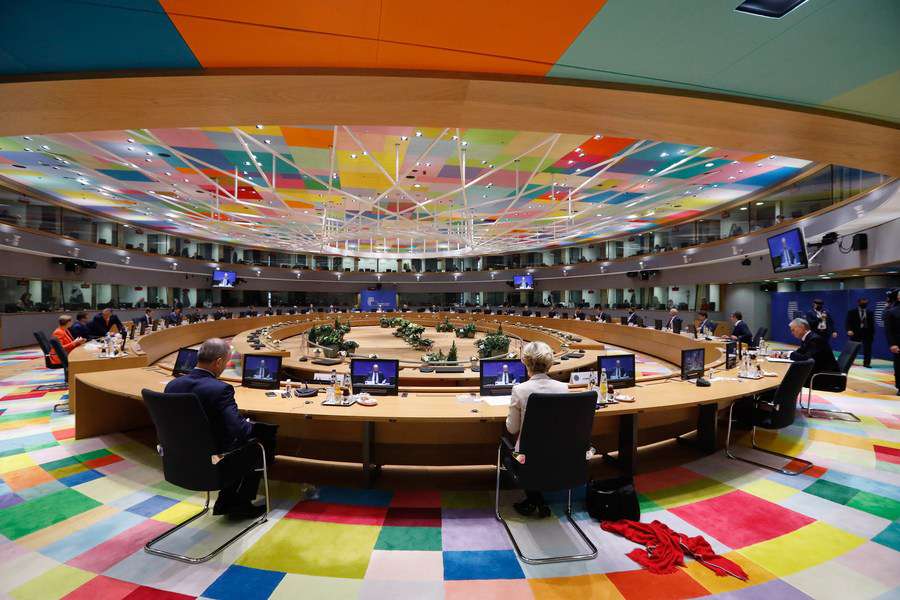
Photo taken on Dec. 10, 2020 shows a scene at the EU summit in Brussels, Belgium. (European Union/Handout via Xinhua)
Meanwhile, economic cooperation between China and the EU has sustained momentum and kept pacing to a broader stage, with more opportunities sprouting after the completion of China-EU investment agreement negotiations and the entry into force of the China-EU agreement on geographical indications in 2021.
Similarly, an array of deals have been sealed in Asia Pacific countries. The Regional Comprehensive Economic Partnership, a free trade pact signed in November, is widely believed to become a key driver to reboot regional economic growth in the post-COVID-19 era.
Economic activity in developing Asia is forecast to pick up to 6.8 percent in 2021 as the region moves toward recovery from the pandemic, according to an Asian Development Bank report released in December.
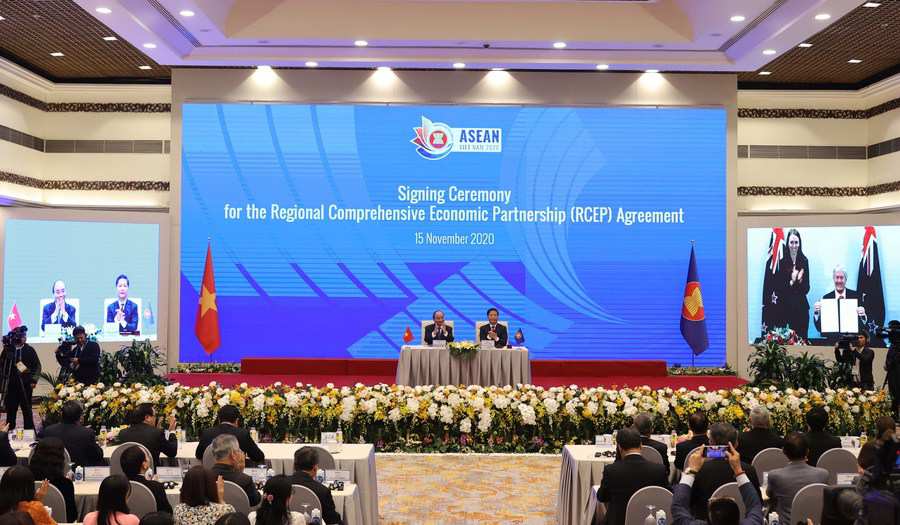
The signing ceremony of the Regional Comprehensive Economic Partnership (RCEP) agreement is held via video conference in Hanoi, Vietnam, Nov. 15, 2020. (VNA via Xinhua)
COOLING DOWN TENSIONS
Instability and social unrest remain as a major theme for some regions this year, which asks for unremitting efforts of relevant parties to cool down tensions and maintain negotiations to find a way out.
In the Middle East, the U.S. escalation of maximum pressure on Iran has intensified the two countries' face-off and caused widespread concern.
Four Arab countries have successively announced the normalization of relations with Israel. Ding Long, a researcher at the University of International Business and Economics in Beijing, said the normalization may aggravate the division of the Arab world, bringing a profound impact on the geopolitical landscape in the Middle East.
On the other hand, Saudi Arabia, the United Arab Emirates, Bahrain and Egypt earlier this month decided to end three and a half years of diplomatic crisis with Qatar, showing their resolution to manage their divergences.
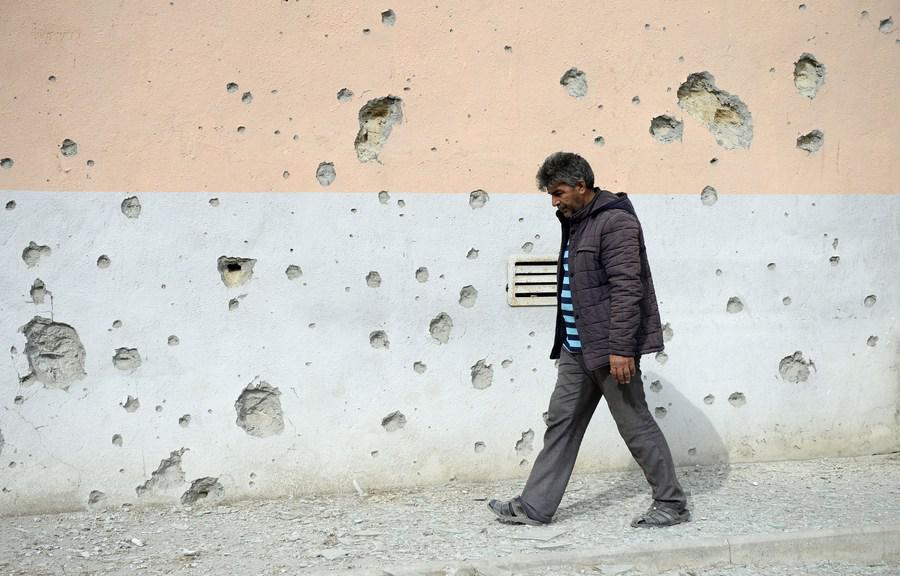
Photo taken on Sept. 29, 2020 shows a man walking past a house damaged during clashes in the Tartar district bordering the Nagorno-Karabakh region. (Photo by Tofik Babayev/Xinhua)
The African continent last year saw a military coup in Mali and a dispute among several governments over Nile water resources.
Encouragingly, upholding the vision of finding "African solutions to African problems," regional organizations including the African Union have been playing an active role in resolving the continent's crises.
Thanks to these efforts, the political situation in West African countries is becoming stable and the peace talks in Libya are back on the right track.
The Eurasian region needs to overcome the repercussions of regional turbulence in 2020, with stability deemed as a promising contributory factor to the region's development.
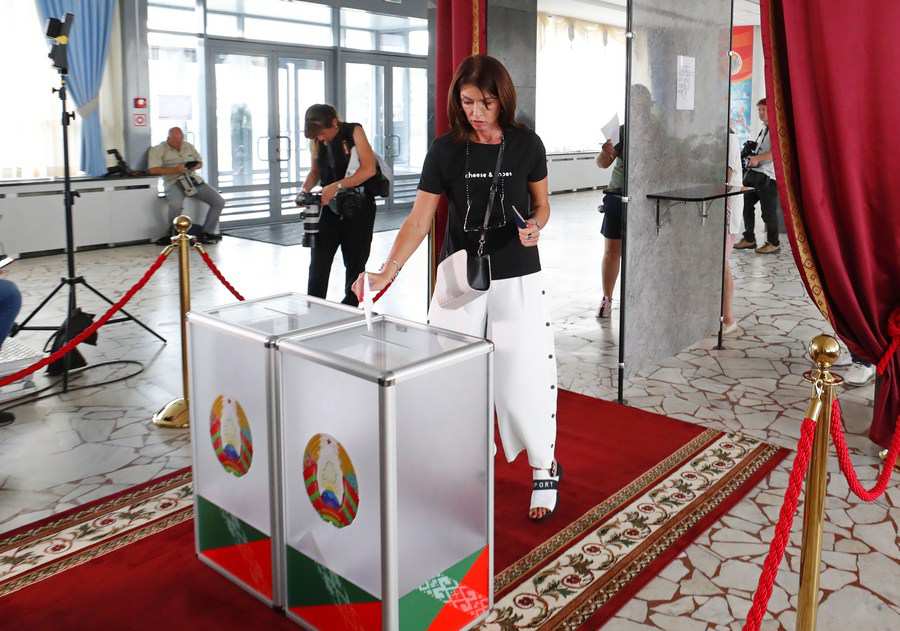
A voter casts her ballot at a polling station in Minsk, Belarus, Aug. 9, 2020. (Photo by Henadz Zhinkov/Xinhua)
In 2020, demonstrations broke out in Belarus following the August presidential election; Kyrgyzstan's parliamentary election sparked off political unrest; and armed conflicts between Armenia and Azerbaijan in the Nagorno-Karabakh region flared up again.
Big-power influence plays a significant role in determining the prospect for regional growth, but the rivalry between major countries, experts warn, will drag on or even become more intense in Eurasia in 2021.
The good news is that as this year marks the 20th anniversary of both the signing of the China-Russia Treaty of Good-Neighborliness and Friendly Cooperation and the establishment of the Shanghai Cooperation Organization, China and Eurasian countries are set to deepen mutually beneficial cooperation in 2021, analysts said.

 Award-winning photos show poverty reduction achievements in NE China's Jilin province
Award-winning photos show poverty reduction achievements in NE China's Jilin province People dance to greet advent of New Year in Ameiqituo Town, Guizhou
People dance to greet advent of New Year in Ameiqituo Town, Guizhou Fire brigade in Shanghai holds group wedding
Fire brigade in Shanghai holds group wedding Tourists enjoy ice sculptures in Datan Town, north China
Tourists enjoy ice sculptures in Datan Town, north China Sunset scenery of Dayan Pagoda in Xi'an
Sunset scenery of Dayan Pagoda in Xi'an Tourists have fun at scenic spot in Nanlong Town, NW China
Tourists have fun at scenic spot in Nanlong Town, NW China Harbin attracts tourists by making best use of ice in winter
Harbin attracts tourists by making best use of ice in winter In pics: FIS Alpine Ski Women's World Cup Slalom
In pics: FIS Alpine Ski Women's World Cup Slalom Black-necked cranes rest at reservoir in Lhunzhub County, Lhasa
Black-necked cranes rest at reservoir in Lhunzhub County, Lhasa China's FAST telescope will be available to foreign scientists in April
China's FAST telescope will be available to foreign scientists in April